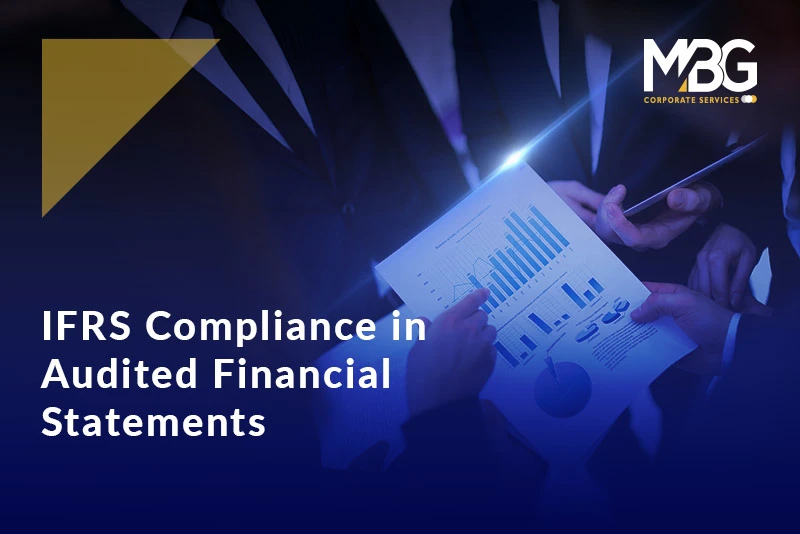IFRS Compliance in Audited Financial Statements: What UAE Businesses Must Know?
International Financial Reporting Standards (IFRS) compliance is a regulatory and fundamental requirement for businesses in the UAE. Compliant and accurate financial statements show financial transparency and build trust among stakeholders such as regulators, local and international partners, investors, and financial institutions. Whether you are a small startup or a large multinational company, audited financial records are the means to understand the financial health of your business. This article explains everything that UAE businesses must know about IFRS compliance in audited financial statements.
Benefits of IFRS Compliance for UAE Businesses
IFRS are global accounting standards for preparation of financial statements. They act as a global accounting benchmark to compare and assess the consistency of financials of a company. In the UAE, IFRS is the only accounting standard accepted by authorities. It is beneficial for businesses in many ways.
1. Transparency in financial statements
Audited financial statements compliant with IFRS bring a lot of financial transparency for companies. Because of their reliable reporting, banks, investors and regulators see such companies as more trustworthy. A clear and trustworthy image of the company also attracts international investors as it gives them higher confidence in the company’s financial performance.
2. Accurate financial reporting
Businesses following IFRS compliance in financial reporting show that their financial statements are correct. It gives the most accurate view of the financial health and performance of a business. It helps in better business planning and decision-making.
3. Global acceptance
IFRS accounting standards bring standardisation in financial reporting by providing one common reporting language for all. It enables UAE businesses to meet international standards and improves their international acceptance. It helps companies to expand in the outside market and attract global investors.
4. Meet tax compliance
The corporate tax law in the UAE requires companies to align their financial reports with IFRS. It is mandatory for tax compliance. In fact, it is a prerequisite for corporate tax calculation and report submission. Companies that meet this requirement avoid the risk of costly penalties and fines by the tax authorities.
IFRS Compliance Requirement for UAE Businesses
The UAE has made IFRS compliance compulsory for financial institutions and companies that are listed on the Abu Dhabi Securities Exchange (ADX) and the Dubai Financial Market (DFM). All public companies need to prepare financial statements based on IFRS standards issued by the International Accounting Standards Board (IASB).
Corporate tax has also made IFRS adoption compulsory for a majority of businesses. For instance, businesses that have an annual revenue of more than AED 3 million need to prepare financial reporting as per IFRS. Apart from this, a few regulatory bodies and free zones may also need to prepare financial reporting as per IFRS.
Common Challenges in IFRS Implementation
The biggest challenge that businesses face in implementing IFRS is interpreting complex standards. It often leads to errors and non-compliance. The second big problem is the intricacies associated with IFRS adoption. It needs system adjustments as well as internal policy adjustments. Apart from this, technical complexities and data gaps add to the challenges in IFRS implementation.
All of these problems lead to misstatements and compliance issues. And, non-compliance can result in strict consequences. You can face penalties, fines, loss of credibility, loss of trust among stakeholders, suspension of license, and sometimes tax reassessments.
But what can help businesses overcome these challenges are:
- Thoughtful planning around the implementation of IFRS
- Seeking advice from experts for technical matters of business
- Hiring qualified accountants who have in-depth knowledge of IFRS and corporate tax laws
- Making accounting structures in line with IFRS reporting requirements
- Doing regular audits to do away with the risk of non-compliance
- Integrating Generally Accepted Accounting Policies (GAAP) with IFRS
- Continuous training and development of the staff to stay updated with the evolving IFRS regulations
Get IFRS advisory from MBG Corporate Services
Are you looking for financial audit reports as per IFRS? Partner with MBG Corporate Services to get IFRS compliant financial statements. We ensure that your financial reports are accurate, transparent, globally accepted and in line with the regulatory requirements in the UAE.
We follow globally recognised accounting practices to provide financial statements and offer tailored advice to suit your specific needs. We follow best practices in the industry to help others build trust and confidence in your business and your audited financial statements.
The process followed by MBG Corporate Services involves initial assessment of your business, its operations, reporting requirements, accounting records, etc. After collecting all the details, we use IFRS along with ISA i.e. International Standards on Auditing to prepare your financial statements. Based on these globally accepted standards, we prepare your financial statements and disclosures. Once it is prepared, we check the accuracy and compliance requirements. We also check for any potential issues that can lead to non-compliance. Next, we present the financial statements to management and help with final submission to stakeholders.
For more information, get in touch with us now!








